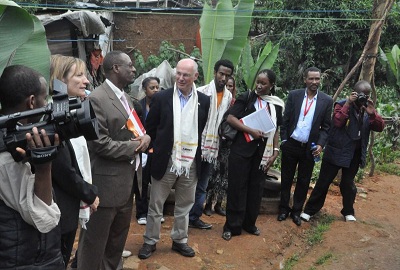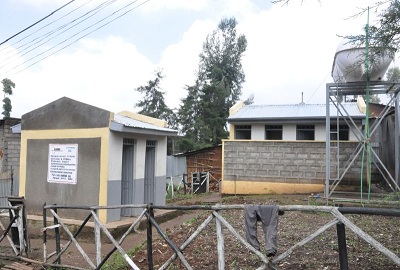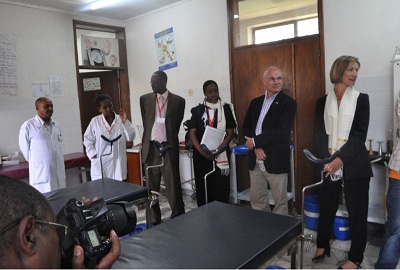31st August 2012
WASH-ing the community

Within a (fairly long) walk of where I live are slum communities where a new shower or latrine block or a supply of clean water within a few steps of home can have a transformational impact on the life of the community.

AMREF (the African and Medical Research Foundation) have been working in the Kechene area of Addis Ababa since 2002 on water, hygiene and sanitation (WASH) projects with help from British companies like Diageo, Euromoney and SKB to provide an integrated approach to some of the main problems facing the local inhabitants. And judging from the reactions of the people, they feel that AMREF is doing an excellent job.
Last week I called with a colleague on AMREF Ethiopia staff at their head office, just a few hundred metres from the front gate of the British Embassy, to be briefed on their projects throughout Ethiopia – a mixture of capacity-building for local services and community programmes. And then we went to visit WASH projects in Kechene that were both new and a few years old (but still working well) and the nearby Salem Health Centre – where the statistics clearly show that these interventions are having a direct and beneficial effect on mortality and other health indicators.
In Kechene, poor as they are, the inhabitants insisted on holding a traditional coffee ceremony for us.

Ethiopia has made impressive progress overall towards achieving the Millennium Development Goals over the past 5 years – child mortality has declined by 8%; incidence of malaria has halved; and over 80% of children are being immunised against measles.
These excellent results help explain why the UK is investing so much development assistance in the country – to put it in perspective, UK taxpayers have helped save a child’s life every hour over the past 5 years here. But the challenges are still enormous – less than half of the population have access to clean water and are therefore vulnerable to diarrhoea and water-borne diseases. And more people than in any other African country have no access to latrines.

The government of Ethiopia have ambitious programmes to deal with these challenges. And the UK Department for International Development (DFID) are working closely with them and civil society organisations like AMREF to support health (e.g. paying for 34,000 health extension workers helping the rural poor; 1.3 couples accessing family planning; 500,000 more women delivering in facilities with a nurse or midwife; and children being vaccinated and sleeping under mosquito nets) and water/sanitation (e.g. improving 1.4 million people’s access to water and improved sanitation by 2015 and another 2 million by 2017).
Long live Amref Ethiopia,Longlive DFID, Longlive H.E. the Ambassador Greg Dorey of UK for supporting the needy Africans. The health gap is still big.
Dear Ambassador Greg Dorey,
Many thanks for taking your time to visit AMREF and our projects as well as the well narrated message in your blog.
We will be working closely with DfiD to improve the maternal and child health indicators.
Bets Regards
Awoke
This was a great and exemplary gesture by H.E. the Ambassador to the needy communities residing in the slums just in the Sub-urbs of Addis Ababa City. Many thanks to the UK Goverment, private sectors for contributing to efforts of the Ethiopian Government and through NGOs like AMREF in improving the health status of the communities, women and children living in Kachene.